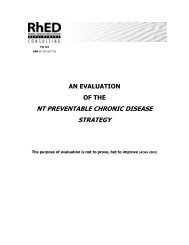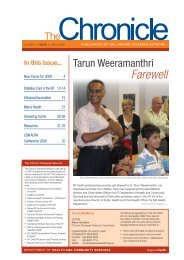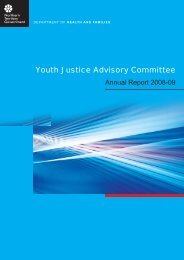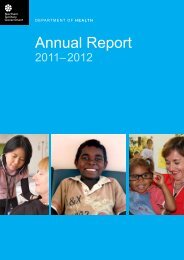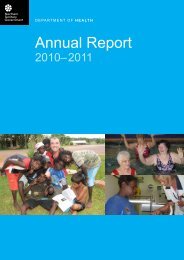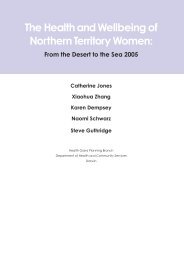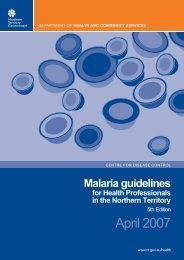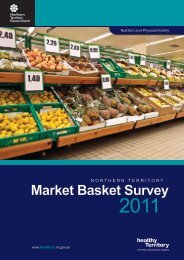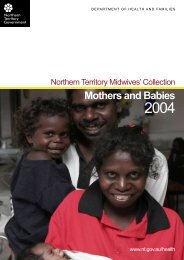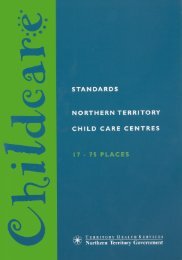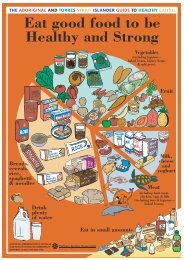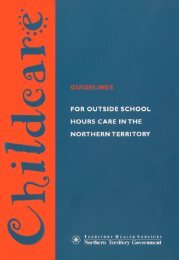DHF Annual Report 2009 - NT Health Digital Library - Northern ...
DHF Annual Report 2009 - NT Health Digital Library - Northern ...
DHF Annual Report 2009 - NT Health Digital Library - Northern ...
Create successful ePaper yourself
Turn your PDF publications into a flip-book with our unique Google optimized e-Paper software.
Connecting CareAlmost every Australian will receive hospital care at some time in their life, whether in a birthing suite, outpatientsdepartment, emergency department, medical or surgical ward, cancer care facility, or a palliative care unit.Many will attend community health and remote health centres, and renal dialysis units, or receive help formental health concerns. Support services for families and children are also accessed frequently.A particular priority is to help people better manage their health and wellbeing in a non-hospital setting. Whenhospital visits are necessary, these should be handled in ways that are more convenient to the patient, offercare, earlier discharge and hospital-in-the-home strategies, and closer collaboration with General Practitionersand community health services.The <strong>Northern</strong> Territory is the nation’s most culturally diverse and geographically dispersed jurisdiction. It has a smallpopulation yet many complex health challenges. It also has the nation’s highest per capita rate of hospital admissions.Providing more alternatives to in-patient care must be the way of the future. Aboriginal people have a high burdenof disease that requires particular attention. This is aspecial challenge in the more remote communities.Key focus areasFamilies and the individuals who comprise them arecentral to the <strong>Northern</strong> Territory’s social fabric and to preventive, primary and acute health care provision, andthe support services that we provide. The Department’smatrix of health care and family services will continueto help Territorians have a good start in life, enjoy ahealthy childhood and adolescence.We delivered in <strong>2009</strong>-10Working effectively and proactively with partners in thebuild the best possible service system for the <strong>Northern</strong>Territory.Placing clients and their needs at the centre of serviceplanning and service delivery.Ongoing participation in Territory Growth Town forums, collaborating with relevant agencies, to ensurethe Territory Growth Town initiatives.Planning is currently underway with a range of stakeholders to commence sexual health research into thecultural context and risk for adolescents. The <strong>Northern</strong> Territory component of this research is supportedthrough the Indigenous Early Childhood Development National Partnership Agreement with Menzies Schoolof <strong>Health</strong> Research managing the project. Research partners in the <strong>Northern</strong> Territory include Danila Dilba partners include South Australia and Western Australia governments.Appointed a Project Manager to conduct a needs analysis relating to opportunities for adolescent sexualhealth promotion in the <strong>Northern</strong> Territory. It is envisaged that seven Adolescent Sexual <strong>Health</strong> Promotion forms part of the Indigenous Early Childhood Development National Partnership Agreement. Senior <strong>Health</strong>to provide support and advice to specialist and remote primary health care staff to develop and implementadolescent health programs.Employed a Project Coordinator in February 2010 to undertake a needs analysis investigating the current approach,barriers/opportunities and models of service delivery for adolescents with complex behavioural problems.36Department <strong>Health</strong> and Families



